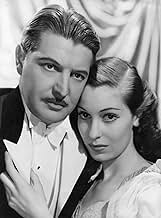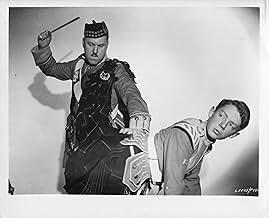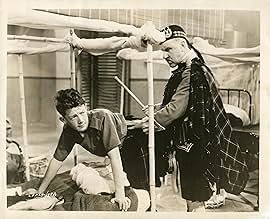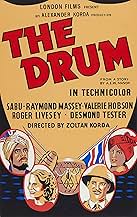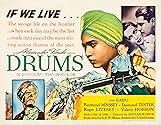Adicionar um enredo no seu idiomaDuring the British Raj, Captain Carruthers works undercover to track smuggled shipments of arms on the restless North West Frontier of India. He fears a full-scale rebellion is brewing. To f... Ler tudoDuring the British Raj, Captain Carruthers works undercover to track smuggled shipments of arms on the restless North West Frontier of India. He fears a full-scale rebellion is brewing. To forestall this, the British governor signs a treaty with the friendly, peace-loving ruler o... Ler tudoDuring the British Raj, Captain Carruthers works undercover to track smuggled shipments of arms on the restless North West Frontier of India. He fears a full-scale rebellion is brewing. To forestall this, the British governor signs a treaty with the friendly, peace-loving ruler of Tokot, a key kingdom in the region, which is described as four days' march northward fro... Ler tudo
- Direção
- Roteiristas
- Artistas
- Prêmios
- 1 vitória e 1 indicação no total
- Governor
- (as Francis L.Sullivan)
- Zarullah
- (as Lawrence Baskcomb)
- Sergeant
- (as Julian Mitchell)
Avaliações em destaque
The always-excellent Sabu steals the film, as ever, in his role first as a self-possessed princeling and then as a fugitive in exile from his throne; the romantic leads, while well-performed, are less memorable. The tension in the banquet scene is tangible, and Raymond Massey as the usurper brings brains as well as menace to his role. The one element that rather shocked me -- with the exception of the inadvertent glimpse of buttock that reveals exactly what Scotsmen do or don't wear under their kilts! -- was the scene in which the said usurper is shot down by our wounded hero in cold blood, having thrown down his weapon. It's not customary for such an act to be depicted in an apparently approving manner; and certainly not in a film of this period...
I must admit that the question of the period itself had me slightly puzzled, although the mention of syncopation in the drum part for the dance should have given me a clue. I had automatically assumed the story to be set in nineteenth-century India in the heyday of the Raj rather than the contemporary world, and with few European civilian fashions on display, there was nothing to disabuse me of this until the heroine made an appearance in jodhpurs, which came as something of a shock! (And the subconscious resonance with the valleys of 'Carry On up the Khyber' turns out to be based in fact: locations from both were shot in Wales...)
But 'The Drum' is a rousing adventure as they used to make 'em, in the tradition of 'Charge of the Light Brigade' or 'Northwest Frontier'; if you like the genre, this one is a cracker.
Sir Alexander Korda's London Films was responsible for this lively Technicolor action film which boasted outdoor scenes shot near the North-West Frontier with the assistance of the Mehtar of Chitral. It blends excitement, humor & history - definitely from a British viewpoint - into an attractive package sure to entertain the viewer lucky enough to find it.
Indian actor Sabu stars as the young Prince of Tokot who finds his life suddenly become very dangerous when he's forced to flee his usurping uncle and accept protection from the British Raj. Plummy-voiced Roger Livesey plays the Raj's stalwart envoy to Tokot who must find a way to stop the import of weapons to the evil new Khan, Raymond Massey, who is fomenting a rebellion. All three actors play their parts very well, with Massey especially attacking his villainous role with gusto.
Also in the cast are Valerie Hobson as Livesey's courageous wife; David Tree as a junior officer; and corpulent Francis L. Sullivan as the local Governor in Peshawar. Alfred Goddard appears unbilled as the hapless private Kelly.
*************************
Born Sabu Dastagir in 1924, Sabu was employed in the Maharaja of Mysore's stables when he was discovered by Korda's company and set before the cameras. His first four films (ELEPHANT BOY-1937, THE DRUM-1938, THE THIEF OF BAGDAD-1940, JUNGLE BOOK-1942) were his best and he found himself working out of Hollywood when they were completed. After distinguished military service in World War II he resumed his film career, but he became endlessly confined for years playing ethnic roles in undistinguished minor films, BLACK NARCISSUS (1947) being the one great exception. His final movie, Walt Disney's A TIGER WALKS (1964) was an improvement, but it was too late. Sabu had died of a heart attack in late 1963, only 39 years of age.
Você sabia?
- CuriosidadesThe film caused protests when shown in Bombay and Madras, as it was considered by many to be British propaganda.
- Versões alternativasVersion shown on Turner Classic Movies from "The Criterion Collection" runs 93 minutes
- ConexõesFeatured in Family Classics: Family Classics: The Drum (1964)
Principais escolhas
- How long is The Drum?Fornecido pela Alexa
Detalhes
- Tempo de duração1 hora 44 minutos
- Proporção
- 1.37 : 1
Contribua para esta página


